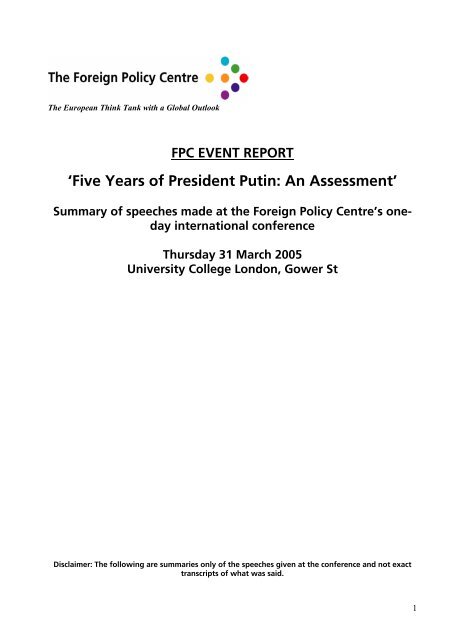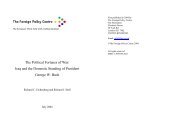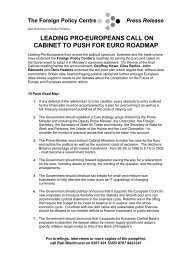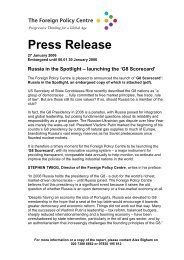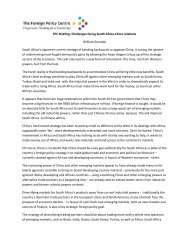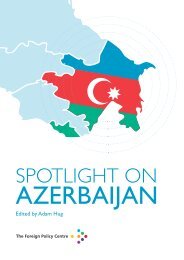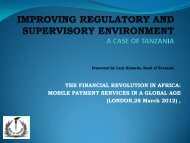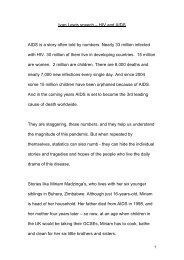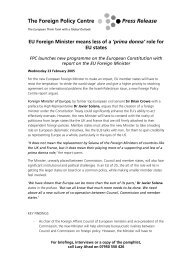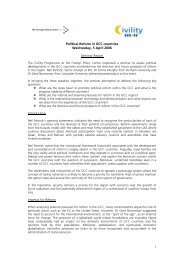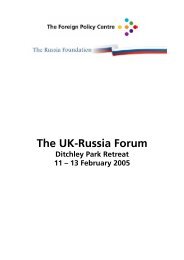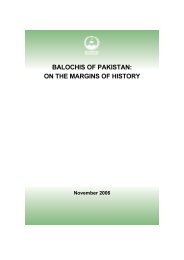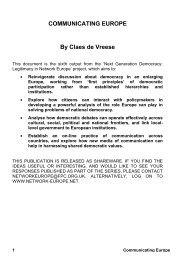'Five Years of President Putin: An Assessment' - Foreign Policy Centre
'Five Years of President Putin: An Assessment' - Foreign Policy Centre
'Five Years of President Putin: An Assessment' - Foreign Policy Centre
You also want an ePaper? Increase the reach of your titles
YUMPU automatically turns print PDFs into web optimized ePapers that Google loves.
The European Think Tank with a Global Outlook<br />
FPC EVENT REPORT<br />
‘Five <strong>Years</strong> <strong>of</strong> <strong>President</strong> <strong>Putin</strong>: <strong>An</strong> Assessment’<br />
Summary <strong>of</strong> speeches made at the <strong>Foreign</strong> <strong>Policy</strong> <strong>Centre</strong>’s oneday<br />
international conference<br />
Thursday 31 March 2005<br />
University College London, Gower St<br />
Disclaimer: The following are summaries only <strong>of</strong> the speeches given at the conference and not exact<br />
transcripts <strong>of</strong> what was said.<br />
1
Keynote Speech<br />
Carsten Søndergaard<br />
Danish State Secretary<br />
Conference Speakers<br />
Who Pulls the Strings in the <strong>Putin</strong> Administration?<br />
Dr. Alex Pravda, 3<br />
Director <strong>of</strong> the Russian and Eurasian Studies <strong>Centre</strong>, University <strong>of</strong> Oxford<br />
Winners & Losers: Has <strong>Putin</strong> Delivered a More Equitable Society?<br />
Dr <strong>An</strong>astasia Nesvetailova 4<br />
Lecturer at the Department <strong>of</strong> International Relations and Politics, University <strong>of</strong> Sussex<br />
Bridget Kendall 5<br />
BBC Diplomatic Correspondent<br />
Justice in the Legal Reforms?<br />
Dr. Vadim Malkin 6<br />
Director General <strong>of</strong> the Russian Axis<br />
Paul Melling 7<br />
Founding Partner at Baker and McKenzie, Moscow<br />
<strong>Putin</strong>’s <strong>Foreign</strong> <strong>Policy</strong> Goals and Relations with Europe<br />
Dr. Thomas Gomart, 8<br />
Head <strong>of</strong> the Russian/CIS Programme at the French Institute <strong>of</strong> International Relations<br />
Dr. Gabor Beszterczey, 9<br />
Director <strong>of</strong> External Affairs for the New Eurasia Foundation<br />
Page<br />
Biographies <strong>of</strong> Conference Speakers 10<br />
2
Who Pulls the Strings in the <strong>Putin</strong> Administration? Top<br />
Dr. Alex Pravda<br />
It is widely accepted that Russia is run by a small number <strong>of</strong> people who are not democratically<br />
elected. This poses the question <strong>of</strong> whether Russia is heading down the road to<br />
authoritarianism. It is therefore necessary to examine (1) who in this small group pulls the<br />
strings <strong>of</strong> power and (2) whether effective string-pulling impedes the formulation <strong>of</strong> good<br />
policy.<br />
There has been a marked shift between <strong>Putin</strong>’s first term in <strong>of</strong>fice and the beginning <strong>of</strong> his<br />
second. In his first term, <strong>Putin</strong> cautiously dealt with the judiciary and the Duma; now he has<br />
embarked on a consolidation <strong>of</strong> power. It seems to many observers that <strong>Putin</strong> believes that the<br />
political system should be fashioned according to his beliefs and principles: Institutional<br />
contest is messy, not to mention dangerous, and is entirely unsuitable for the modernisation <strong>of</strong><br />
Russia and its return to great power status.<br />
It is difficult to know how much power actually lies at the centre <strong>of</strong> the Russian state and who<br />
pulls the strings. The more power is concentrated the more opaque it becomes and<br />
accordingly, there is less clarity now about who holds power than in the Yeltsin period.<br />
Although the oligarchs have the resources to protest at the centralisation <strong>of</strong> power, the<br />
investigation into Yukos and the trial <strong>of</strong> Mikhail Khodorkovsky has warned <strong>of</strong> the cost <strong>of</strong><br />
challenging <strong>Putin</strong>’s centralisation <strong>of</strong> power, thereby maintaining the modus vivendi.<br />
Officials, aides, key ministers and much <strong>of</strong> the state bureaucracy share similar roots; most<br />
either come form <strong>Putin</strong>’s home-town <strong>of</strong> St Petersburg, or have the required background in the<br />
security services. Bureaucrats are chosen on the basis <strong>of</strong> reliability and loyalty, not who is best<br />
for the job. The apparatus has now become self sustaining with decreasing competence and<br />
much loyalty. This has subsequently led to poor analysis on foreign policy and domestic policy,<br />
best illustrated by the popular protest at social benefit reforms last February.<br />
<strong>Putin</strong>’s Presidency is weakening: authoritarian regimes are not very effective, but are good at<br />
short-term damage limitation. This creates a climate <strong>of</strong> uncertainty, which allows <strong>Putin</strong> room<br />
for manoeuvre on deciding policy. However, this approach undermines long term sustainability<br />
because much needed reforms and policy initiatives that tackle social issues are not formulated<br />
or implemented. Regardless <strong>of</strong> who pulls the strings, it seems the strings themselves are<br />
becoming threadbare.<br />
Top<br />
3
Winners & Losers: Has <strong>Putin</strong> Delivered a More Equitable Society? Top<br />
Dr. <strong>An</strong>astasia Nesevtailova<br />
The devaluation <strong>of</strong> the rouble in 1998 witnessed devastating social consequences. The savings<br />
<strong>of</strong> the middle classes were wiped out in an instant, reducing the majority <strong>of</strong> Russians to<br />
poverty. Compared to the USSR in 1989, Russia had fallen over a hundred places in the world<br />
rankings <strong>of</strong> GDP by 1999. While Africa, Asia and South America actually reduced poverty,<br />
European Russia was one <strong>of</strong> few regions where poverty actually during the 1990s.<br />
The <strong>Putin</strong> administration has seen a drastic change from the misfortunes under Yeltsin and the<br />
admittedly failed techniques <strong>of</strong> shock-therapy. The former KGB <strong>of</strong>ficer appeared as a<br />
reformer, a populist and the solution to Russia’s problems, but it is likely that anyone following<br />
Yeltsin would have appeared so. His popularity polls remained astronomical during most <strong>of</strong><br />
his time in the Kremlin, as high as 60-70 per cent, falling only recently to 40-60 per cent with<br />
the unpopular monetisation <strong>of</strong> pensions. Yet this still compares favourably compared to<br />
Yeltsin’s 9 per cent.<br />
On the surface, Russia has come a long way since the troubles <strong>of</strong> the last decade. Reforms<br />
have ranged from budget and tax to labour, pensions and social benefits. Structural reforms<br />
have also been tackled with legislation on the land code, anti-monopoly and money<br />
laundering. It seems to be working, with the budget looking healthy with growth, surplus and<br />
large reserves. Russia has one <strong>of</strong> the lowest income taxes in the world, with the implicit<br />
meaning that people should take care <strong>of</strong> themselves, thereby reducing the government’s social<br />
responsibility.<br />
On closer inspection, however, gains made do not seem so clear cut. The taxable fund is<br />
structured so that 70 per cent comes from salaries and wages, 20 per cent from basic<br />
revenues and 5-10 percent from natural rent. This system makes for uneconomical business<br />
and should in fact be the reverse, with natural rent at a higher rate.<br />
The statistics on poverty highlight two different trends. On the one hand, poverty decreased<br />
from 26.5 per cent to 16.1 per cent during 2003, dropping still further to 14.6 per cent in<br />
2004. Real incomes increased during 2004, with the poorest 10 per cent actually up 6 per<br />
cent. On the other hand, however, 80 per cent <strong>of</strong> Russia’s poor are poorer compared to the<br />
Yeltsin era.<br />
In reality, the gulf between Russia’s rich and poor has widened since 1999. Before <strong>Putin</strong><br />
became president, the difference was fourteen-fold, while by 2004 this had risen to fifteenfold.<br />
Even though Russia is ranked fourth in the world for the number <strong>of</strong> super-rich, its GDP<br />
still resides at a lowly 78 th place, worse than the nadir <strong>of</strong> the USSR.<br />
Bridget Kendall<br />
In 1999, the wealth gap was already substantial, with notable geographical differences as<br />
well. Many Russians suffered as savings were lost, wages held in arrears, pensions went<br />
unpaid, jobs were lost and businesses closed after a decade <strong>of</strong> instability.<br />
Top<br />
4
To counter this, the last five years have seen big changes, with economic reform to increase<br />
investment, create stability, reduce poverty and even have back-wages paid. Russia witnessed<br />
impressive macroeconomic growth, the stabilisation <strong>of</strong> the rouble, the growth <strong>of</strong> the middle<br />
class, wages doubling and a rise in the housing market. These created positive impacts on the<br />
people, but has life become more equitable?<br />
The wealth gap is <strong>of</strong> primary concern here. Eight per cent <strong>of</strong> Russians cannot afford food,<br />
while a further 34 per cent cannot afford anything beyond food. Unemployment has not<br />
fallen, and statistics do not include those unregistered to receive benefits.<br />
Geographically there are only pockets <strong>of</strong> extreme wealth. Moscow is six times richer than the<br />
countryside and there have been protests against local authorities. The maintenance <strong>of</strong><br />
infrastructure in remote regions has depended on the potential for economic development.<br />
Those towns that cannot supply jobs remain without decent lines <strong>of</strong> communication. Roads<br />
are so bad and travel so expensive that migration has become too difficult, even for the<br />
sponsored.<br />
There is also a new worry about stagnation. Kudrin has admitted that the economy is slowing<br />
down. Capital flight, the Yukos affair and lack <strong>of</strong> foreign investment have all taken their toll.<br />
Small businesses that are critical to the community are the only ones to regularly make a<br />
pr<strong>of</strong>it. This can be seen by the bankrupt local authorities tapping their wealth to help improve<br />
the area.<br />
On a macro scale, long term prospects look good. Yet there is a mismatch with<br />
microeconomic forecasts. There is concern that there is a certain complacency with the<br />
optimism based on oil, where in fact Russia’s best reserves are in people. Yet educational<br />
standards are eroding and urgent demographic trends show a falling birth rate and shortening<br />
life spans for men. So the long term will in fact be too late.<br />
Russia should be viewed, not as the new Chile, with its descent into dictatorship, but as the<br />
new Nigeria.<br />
Top<br />
5
Justice in the Legal Reforms? Top<br />
Dr. Vadim Malkin<br />
The views on Russia’s rule <strong>of</strong> law and judiciary are both wrong and right. Legal reforms faced<br />
great challenges to change from the Soviet style to the market economy. During the<br />
Communist era, criminal courts convicted 99 per cent <strong>of</strong> those tried. Only after 1991 did they<br />
start to become more independent. Civil courts also faced a big challenge to change and<br />
corruption was rife since wages were so low. Instead <strong>of</strong> a system <strong>of</strong> law within the judiciary,<br />
there was a system <strong>of</strong> bribes. With that branch <strong>of</strong> government so weak, <strong>Putin</strong> has managed<br />
to consolidate power over it during his time in <strong>of</strong>fice.<br />
Paul Melling<br />
Great strides have been made in the last sixteen years in Russia, but do people realise that<br />
change has taken place? Is there now a rule <strong>of</strong> law in Russia? This depends on whether or<br />
not you are on the ‘radar screen’ <strong>of</strong> the Kremlin. If you are large, rich and important enough<br />
to be noticed by the bureaucracy, such as BP, you find it much more difficult to do business.<br />
The problem here is the lack <strong>of</strong> an idea <strong>of</strong> ‘conflict <strong>of</strong> interest’. The atmosphere is such that it<br />
would be almost scandalous if you did not abuse you own position for personal gain. The<br />
paradox is that if corruption did not exist, nothing would ever get done in Russia.<br />
<strong>Putin</strong>’s tax reforms have brought a greater respect for the rule <strong>of</strong> law. The flat tax <strong>of</strong> 13 per<br />
cent has made Russia a tax haven, shifting the economy from black to white. Before the<br />
change, 80 per cent <strong>of</strong> business was run on the black market. Since then, only 20 per cent<br />
remains undeclared.<br />
Changes to the Russian commercial court system have made domestic litigation the fastest<br />
growing business for Western firms in Russia. Unfortunately, if you are caught on the ‘radar<br />
screen’ then all the problems with the rule <strong>of</strong> law come to the fore: your chances are less than<br />
good if you litigate against the Russian government. The only thing that can be said <strong>of</strong> the<br />
whole system is that it is always over remarkably quickly.<br />
Top<br />
Top<br />
6
<strong>Putin</strong>’s <strong>Foreign</strong> <strong>Policy</strong> Goals and Relations with Europe Top<br />
Dr. Thomas Gomart<br />
Last year can be seen as a turning point for Russian foreign policy. With EU enlargement and<br />
the Orange Revolution in the Ukraine, the relationship between Russia and Europe has<br />
changed. Crisis and misunderstanding has put <strong>Putin</strong> on the defensive. The results <strong>of</strong> Beslan,<br />
the Ukraine, Moldova and Chechnya have created a negative image abroad.<br />
<strong>Putin</strong> therefore wants to correct this perception while limiting changes. He knows that Europe<br />
is the future, yet appears ambivalent to Brussels. True to Russian tradition, they will continue<br />
to build diplomatic relations on a bilateral basis. It remains more comfortable for Russian<br />
diplomats to avoid Brussels and the new member states. In this way it can create a balance <strong>of</strong><br />
power where Russia can speak as an equal, but an equal <strong>of</strong> one country to twenty-five.<br />
Dr. Gabor Beszterczey<br />
Russia’s foreign policy can be considered as its weakest link. With Russia’s concentration <strong>of</strong><br />
power has come increased isolationism. Yet Russia still has a dialogue with its counterparts in<br />
Europe. Some in the Kremlin see an EU ‘encirclement’, which could explain why EU-Russia<br />
relations do not exist: diplomatic exchanges are always done on bi- or tri-lateral bases.<br />
When it comes to relations with Russia, influence on a state level is inefficient. With relations<br />
with Europe at a low ebb, the EU should work with the US. However, those on the continent<br />
are working on their own means to avoid Russian isolation. Chirac’s conception <strong>of</strong> a multipolar<br />
world has facilitated relationships between Paris and Moscow; Moscow and Paris already<br />
have agreements on security, involving strategy, defence and nuclear policies. A commercial<br />
relationship has also been fostered. Berlin and Madrid are following suit, but disagreements<br />
have arisen on how best to avoid isolationism.<br />
Both sides must make efforts to clarify their positions, but it must be recognised that Eastern<br />
Europe cannot form a bridge. Europe is rather intrusive compared to the US and EU<br />
enlargement is seen by some as a threat. Yet Russia still suffers from an ideological hangover<br />
from the Soviet era. <strong>Putin</strong> still plays by the old rules but is favourable compared to Yeltsin’s<br />
dual nature foreign policy. <strong>Putin</strong> has a problem with the West, so in the end relations with<br />
Europe will probably deteriorate.<br />
Top<br />
Top<br />
7
Biographies <strong>of</strong> Conference Speakers<br />
Carsten Søndergaard has been the State Secretary for <strong>Foreign</strong> and Security <strong>Policy</strong>, EU <strong>Policy</strong><br />
and EU Coordination in the Danish Ministry <strong>of</strong> <strong>Foreign</strong> Affairs since 2001. During his<br />
diplomatic career Mr Søndergaard has been Ambassador to Turkey (1999-2001), has served at<br />
the Danish embasssies in London and Washington, and has held a number <strong>of</strong> high level <strong>of</strong>fices<br />
within the Ministry <strong>of</strong> <strong>Foreign</strong> Affairs in Copenhagen. He has a Masters degree in Political<br />
Science from the University <strong>of</strong> Aarhus.<br />
Dr. Alex Pravda is the Director <strong>of</strong> the Russian and Eurasian Studies <strong>Centre</strong>, St <strong>An</strong>tony’s<br />
College, University <strong>of</strong> Oxford. Before coming to Oxford he was director <strong>of</strong> the Soviet foreign<br />
policy programme at the Royal Institute <strong>of</strong> International Affairs (Chatham House). He has acted<br />
as special adviser to the <strong>Foreign</strong> Affairs Committee <strong>of</strong> the House <strong>of</strong> Commons. He has taught<br />
at the University <strong>of</strong> Reading and, on a visiting basis, at Stanford University and the University<br />
<strong>of</strong> Michigan. His publications include Developments in Russian Politics (co-edited,<br />
Macmillan, 2001) and Leading Russia: <strong>Putin</strong> in Perspective (edited, forthcoming Oxford<br />
University Press, 2005).<br />
Dr <strong>An</strong>astasia Nesvetailova is a Lecturer in political economy at the Department <strong>of</strong><br />
International Relations and Politics, University <strong>of</strong> Sussex. Her research and teaching interests<br />
include the globalisation <strong>of</strong> financial markets and aspects <strong>of</strong> capitalist transformations in the<br />
CIS. Her recent publications include, “Coping in Global Financial System? The Political<br />
Economy <strong>of</strong> Non-payment in Russia”, Review <strong>of</strong> International Political Economy, 2004,<br />
5:11; “Asian Tigers, Russian Bear and… International Vets? <strong>An</strong> Excursion in the 1997-98<br />
Financial Crises”, Competition and Change, 2002, 6:3; “Globalization and Post-Soviet<br />
Capitalism: Internalising Neo-liberalism in Russia”, in S. Soederberg et al (eds.), Internalising<br />
Globalization: The Rise <strong>of</strong> Neo-liberalism and the Decline <strong>of</strong> National Varieties <strong>of</strong><br />
Capitalism? Palgrave, 2005; “A Friend in Need or a Friend in Need? Russia and the Belarusian<br />
Economy”, in A. Lewis (ed.), The EU and Belarus, London: Federal Rust for Education and<br />
Research, 2003. She received her PhD degree from the University <strong>of</strong> Wales, Aberystwyth, in<br />
2003<br />
Bridget Kendall, MBE has been BBC diplomatic correspondent since 1998. She is based in<br />
London and covers top foreign stories for radio and television news. In the last five years, she<br />
has followed daily diplomatic and military developments from London in the run-up and<br />
aftermath to the recent war in Iraq, the war in Afghanistan, and the NATO intervention in<br />
Yugoslavia. She has reported from the ground during the military crises in Macedonia and<br />
Chechnya and is a regular presenter for the BBC’s flagship interactive programme Talking<br />
Point. Ms Kendall has made several long documentaries for BBC television, including pr<strong>of</strong>iles<br />
<strong>of</strong> Vladimir <strong>Putin</strong>, Boris Yeltsin and Mikhail Gorbachev. She recently completed a five-part<br />
radio series for the BBC about daily life today in Russian rural regions, the Far North and<br />
Siberia. Ms Kendall has received many awards for journalism, including the James Cameron<br />
Award for distinguished journalism and the Voice <strong>of</strong> the Listener and Viewer’s Radio Award.<br />
In 2003, she was the Roskill Lecturer <strong>of</strong> Churchill College, Cambridge.<br />
Top<br />
8
Dr. Vadim Malkin was appointed Director General in 2003 when Russian Axis was founded.<br />
Vadim was educated at the Russian state film-school and has a PhD degree in Sociology from<br />
the Institute <strong>of</strong> Social Studies <strong>of</strong> the Russian Academy <strong>of</strong> Science.<br />
Vadim has worked as a freelance writer for a variety <strong>of</strong> Russian newspapers and between<br />
1996 and 1997 he worked as an analyst researching the Russian media-audience for Russian<br />
Research, the first Russian media-measuring firm. In 1997 Vadim joined the Moscow <strong>of</strong>fice <strong>of</strong><br />
Burson-Marsteller, advising the World Bank as an information coordinator and, later, as a<br />
project director on its World Bank funded public education campaigns aiming to promote the<br />
rule-<strong>of</strong>-law and market economy in Russia.<br />
Vadim was Editor-in-Chief <strong>of</strong> Federal News Agency in 1999 and the following year was<br />
appointed Information Director <strong>of</strong> the National News Service "Strana.Ru", where he was<br />
responsible for the news department and the national regional and international<br />
correspondents’ network. He also managed Strana.ru’s special projects such as providing<br />
international audiences with up-to-date information on the submarine “Kursk” lifting<br />
operation. In 2001 Vadim organised and chaired the first on-line interview with Russia’s<br />
<strong>President</strong> <strong>Putin</strong>, which has been held by Strana.ru, Gazeta.ru and the BBC.<br />
In 2002 Vadim established JSC “Strategic Communications Agency” specialising in public<br />
relations, media-management and political consulting. JSC acted as advisers to the Russian<br />
liberal party “Yabloko” in the 2003 parliamentary elections in Russia.<br />
Paul Melling is the founding partner <strong>of</strong> Baker & McKenzie's Moscow <strong>of</strong>fice, having opened<br />
that <strong>of</strong>fice in January 1989 and having been resident in Moscow ever since. He is also currently<br />
the Managing Partner <strong>of</strong> Baker & McKenzie Moscow and a member <strong>of</strong> his firm's CIS<br />
Management Committee. He graduated from Oxford University in 1978 and joined Baker &<br />
McKenzie in London in February 1980 as a member <strong>of</strong> the firm's East-West Trade department,<br />
specialising in the COMECON countries <strong>of</strong> Eastern Europe and particularly the USSR. From<br />
1982 until his move to Moscow in 1989 Mr. Melling was a Faculty Member <strong>of</strong> the <strong>Centre</strong> for<br />
the Study <strong>of</strong> Socialist Legal Systems at University College London and a Visiting Scholar at the<br />
Institute <strong>of</strong> State and Law in Moscow. Mr. Melling had made over 50 business visits to the<br />
USSR before taking up residence in Moscow. Mr. Melling specialises in corporate and<br />
commercial law, with particular emphasis on the pharmaceuticals/healthcare and information<br />
technology industries. He has been the Honorary Legal Adviser to the British Ambassador in<br />
Moscow since 1990 and is also legal adviser to ECGD, the British Council and the BBC (among<br />
others). He is a member <strong>of</strong> the Advisory Council <strong>of</strong> the Russo-British Chamber <strong>of</strong> Commerce<br />
and a member <strong>of</strong> the Steering Committee <strong>of</strong> the Russia Partnership, a joint venture <strong>of</strong> the<br />
Prince <strong>of</strong> Wales International Business Leaders Forum dedicated to issues <strong>of</strong> corporate social<br />
responsibility in the Russian Federation. He is also a Board member <strong>of</strong> and Honorary Legal<br />
Adviser to the Association <strong>of</strong> International Pharmaceutical Manufacturers in Moscow, positions<br />
he has held since the establishment <strong>of</strong> that Association over 10 years ago. Mr. Melling<br />
features prominently in the Russia chapters <strong>of</strong> European Legal 500, Global Counsel 3000 and<br />
Chambers Global Guide - World's Leading Lawyers. He speaks Russian fluently.<br />
Dr. Thomas Gomart is the head <strong>of</strong> the Russian/CIS programme at The French Institute <strong>of</strong><br />
International Relations (IFRI). He has gathered diverse experience as the Lavoisier Fellow at the<br />
State Institute for International Relations in Moscow, as a Visiting Fellow at the Institute for<br />
9
Security Studies in Paris and as the Marie Curie Fellow at the Department <strong>of</strong> War Studies at<br />
King’s College, London. Dr. Gomart currently teaches at the Military School <strong>of</strong> Saint-Cyr and<br />
has published such books as, "Enlargement Tests the Partnership Between The EU & Russia",<br />
Defence Academy <strong>of</strong> the UK, CSRC, (2004); "Les trois enjeux du partenariat entre l’Union<br />
européenne et la Russie", Politique étrangère, (2004); "<strong>Putin</strong>’s Russia : Towards A New<br />
Combination Of Military <strong>An</strong>d <strong>Foreign</strong> Policies", World Defence Systems, (2004) and<br />
"Vladimir Poutine ou les avatars de la politique étrangère russe", Politique étrangère,<br />
(2003).<br />
Dr. Gabor Beszterczey is the Director <strong>of</strong> External Affairs <strong>of</strong> the Moscow-based New Eurasia<br />
Foundation. Dr. Berscterczey was sent from the Eurasia Foundation’s Washington DC <strong>of</strong>fice to<br />
help set up the first US-European-Russian joint initiative for developing civil society projects in<br />
Russia and creating new channels <strong>of</strong> communications between Russian and the outside world.<br />
Gabor has worked in the past ten years in South America, the US, UK and now in Russia.<br />
Previously, he worked for Hungarian public television as a producer/director. His PhD centred<br />
on the BBC and reinventing public television in Europe.<br />
ENDS<br />
Top<br />
10


